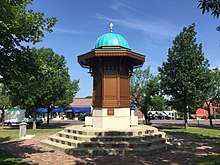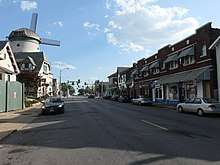History of Bosnian Americans in St. Louis
The city of St. Louis, Missouri, and metropolitan area includes the largest Bosnian population and largest Bosnian population outside of Europe. The highest concentration of Bosnians in St. Louis is in the "Little Bosnia" neighborhood of Bevo Mill. The Bosnian cultural imprint can be seen in the numerous Bosnian restaurants, bakeries, and cafes, as well as several Bosnian mosques and religious organizations.
| Part of a series on |
| Ethnic groups in St. Louis |
|---|


History
.jpg)
The first wave of Bosnians arrived in the 1990s, refugees of the Bosnian War.[1]
On September 29, 2013, the Bosnian community donated a replica of Sebilj (kiosk-shaped public fountain) to the city of St. Louis for its 250th birthday.[2] It was modeled after the famous 18th century one in Sarajevo, to mark the center of their community.
Demographics
As of 2013 there were 70,000 Bosnians in St. Louis. This is the largest population of Bosnians in the United States and the largest Bosnian population outside of Europe.[3] Most are Bosniak and practice Islam, but a minority practice other religions including Roman Catholicism, Eastern Orthodoxy, and Judaism.
The highest concentrations of Bosnians are in the neighborhood of Bevo Mill.[4] There are also Bosnians in Affton, Mehlville and Oakville of south St. Louis County.
References
- "Keeping Up With the Jasarevics". The Riverfront Times. Retrieved 2013-01-31.
- In Little Bosnia, a gift from immigrants -
- "Why Are There So Many Bosnians in St. Louis?". The Atlantic Cities. Retrieved 2013-01-31.
- Gilsinan, Kathy. "Why Are There So Many Bosnians in St. Louis?". The Atlantic Cities. Atlantic Media Company. Retrieved 15 February 2013.
Further reading
- Moore, Doug. "Bosnians in St. Louis area mark a time of trouble " (Archive). St. Louis Post-Dispatch. April 6, 2012.
- Sanchez, Margaux Wexberg. "Bosnians in St. Louis: Reflection 20 years after start of war." St. Louis Beacon. Friday April 6, 2012.
- Schuessler, Ryan. "Yugoslavia’s children, grown up in St. Louis" (Archive). Al Jazeera America. February 22, 2012.